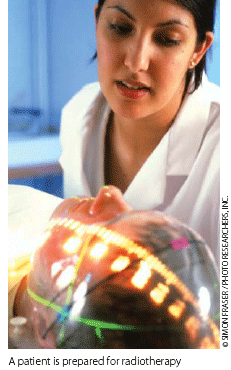The year 1971 was very good for oncology nurses. The National Cancer Act of 1971 provided impetus for a comprehensive program focused on reducing the incidence, morbidity, and mortality of cancer. Cancer survival rates improved, and these events became a catalyst for the emergence of oncology nursing as a specialty. Oncology nursing continued to develop over the years, and nurses began practicing in a variety of settings, including radiation oncology.
MAKING A CAREER IN RADIATION ONCOLOGY NURSING
Nurses practicing in radiation oncology must have an understanding of radiobiology and radiation physics. Terms such as Bragg peak, bolus, electrons, and acronyms such as IMRT (intensity-modulated radiation therapy) and IGRT (image-guided radiation therapy) are common to a radiation oncology nurse’s vocabulary. Over the past 5 to 10 years, radiation oncology has dramatically changed as a result of technologic advances and the development of complicated computer systems, and nurses have had to learn and understand terms such as fiducial markers, proton beam, and tomotherapy. In addition, nurses must understand references to CBCT (cone beam CT), OBI (on-board imaging), and KV/KV (kilovoltage/kilovoltage), to name just a few.
 As cancer treatment becomes more complex and standard chemotherapy regimens are combined with new and targeted agents, radiation oncology nurses need to have the knowledge and skills to accurately assess and intervene. The radiation oncology nurse can be the cornerstone of patient advocacy, extensive symptom management, and patient education regarding complicated treatment regimens.
As cancer treatment becomes more complex and standard chemotherapy regimens are combined with new and targeted agents, radiation oncology nurses need to have the knowledge and skills to accurately assess and intervene. The radiation oncology nurse can be the cornerstone of patient advocacy, extensive symptom management, and patient education regarding complicated treatment regimens.
To be the best they can be, nurses in radiation oncology have many challenges to overcome, including sometimes being the only nurse in the department. Finding mentors and role models from other disciplines is important. The mentor willing to teach and explain why patients are treated with certain technologies could be a physicist, a radiation therapist, or a physician. Radiation oncology nurses have to learn from their physicians, create strong partnerships, ask questions, read independently, attend tumor boards and conferences, and obtain certification in oncology nursing so that they have added credibility in their position.
SOME OF THE NEEDED SKILLS
If you are thinking of becoming a radiation oncology nurse, certain skills will be valuable. Most patients undergoing radiation therapy are outpatients, so you should review the ambulatory care literature to find principles and practice interventions for caring for this type of patient. Keeping current with chemotherapy and learning about new targeted therapies and surgical approaches are also important. In addition, you should expect to maintain competencies specific to the specialty, such as skin care, radiation safety, and phlebotomy skills.
Having the skills needed to care for geriatric adults is essential. Because the incidence of cancer increases with age, many of your patients will be older. This population may require more frequent nursing assessments and closer monitoring of nursing interventions. Ultimately, you must be able to distinguish between the effects of aging and those of radiation and to explain to patients what to expect during therapy and at follow-up visits. Using critical thinking skills to care for these patients, whether they are having acute side effects or dealing with long-term sequelae, is important.